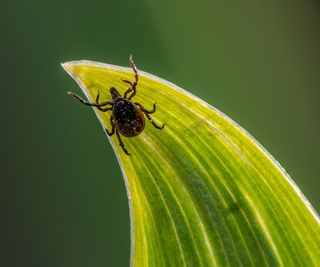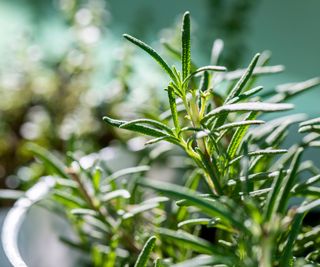Ticks are one of those pests that you want to avoid having in your garden to protect both your family members and your pets. These blood-sucking insects can transmit dangerous diseases from host to host when they cling to the skin.
One of the best methods for repelling ticks in your garden is to choose plants that naturally deter these little creatures. Like mosquito repellent plants and snail repellent plants, there are many plants that ticks cannot tolerate, largely because of their aromas that highlight their sensitive sense of smell.
We’ve compiled an expert list of the best tick repellent plants, so you can incorporate the right ones into your garden to protect others and yourself from the danger they pose.

(Image credit: Robert Körner via Getty Images)
5 anti-tick plants
Keep ticks away from your garden by growing tick-repellent plants. We spoke to experts and they said these are the best plants to naturally deter these pests and secure your garden.
1. Rosemary

(Image credit: photographer DuKai via Getty Images)
The best way to repel ticks is to design a scented garden. Like many other pests, strong aromas are a natural deterrent and some of the most effective plant deterrents are aromatic herbs like rosemary.
“Rosemary is considered the most effective for repelling ticks. Indeed, it contains powerful aromatic compounds such as camphor and cineole which disrupt the sensory perception of the tick,” explains Nicole Charpentier pest control expert and president of Black Pest Prevention.
“What makes rosemary more effective than other plants is its high concentration of these repellent compounds. To protect yourself from ticks, plant rosemary in areas where you spend a lot of time outdoors,” she adds.
Rosemary does well in U.S. plant hardiness zones 8 and 9, benefiting best from a position in full sun. It may be a good idea to grow rosemary around your outdoor living room or where the children play to prevent ticks from latching on to unsuspecting visitors in your garden.
You can find rosemary plants in supermarkets, like this rosemary plant from Walmart.
Nicole Carpenter started working at Black Pest Prevention when she was in high school. She continued to work there while attending NC State University and is now its president. She advises on backyard pest control and assists with pest control in Charlotte and serves North Carolina and South Carolina.
2. Lavender

(Image credit: Pez Photography via Getty Images)
Another fragrant option, gardeners have long grown lavender to repel different pests – it’s an excellent snake repellent plant, mouse repellent plant and tick repellent plant.
“Lavender essential oil has been proven to repel ticks. Fortunately, lavender is visually pleasing and has a pleasant scent to humans, making it the perfect addition to a garden,” says Rocky Beninatopest control expert and founder of Quality Affordable Pest Control.
Lavender is easy to grow and thrives in hardiness zones 5 through 10 in the United States. It gets plenty of sun and you should also continue to prune lavender to encourage longer flowering and a return of flowers.
Another benefit is that lavender is a great plant for pollinators and choosing to have this plant in your garden will attract lots of bees and butterflies, while keeping ticks away.
Find lavender plants online, like this Grosso Lavender from Nature Hills.
Rocky is the founder and certified exterminator of Quality Affordable Pest Control based in Toronto and surrounding areas.
3. Chrysanthemums

(Image credit: Brent Waltermire / Alamy Stock Photo
It is a known fact that chrysanthemums can deter ants and other insects, thanks to their natural repellent qualities.
“Chrysanthemums contain pyrethrum, an ingredient often used in natural insect repellents,” says Nicole. “The pyrethrum in chrysanthemums acts on a chemical level and affects the nerve cells of the ticks, leading to loss of coordination and paralysis of the tick,” she adds.
Growing chrysanthemums is simple, provided they are grown in a sunny location and maintain good humidity levels. These beautiful flowers thrive in U.S. plant hardiness zone 5 to 9 and can be grown from seed, such as with these Amazon chrysanthemum seeds.
You can also keep chrysanthemums blooming longer by cutting them back and providing them with optimal care. This way you will have a colorful display in spring and fall that will keep your garden tick-free.
4. Worries

(Image credit: schnuddel / E+ / Getty Images)
Marigolds are another flower known to deter pests. Marigolds repel insects due to their strong scent, making them one of the best pest repellent plants.
“Marigolds have a strong odor that deters ticks and also contain terpenes, thiophenes and pyrethrins, known for their insect-repelling properties.” Ticks avoid areas planted with marigolds,” notes Nicole.
It may be a good idea to grow marigolds in the areas of your garden that you use most to repel ticks, as well as plant marigolds in your vegetable garden to protect crops from other pests.
Marigolds will bloom from spring to fall, thriving in U.S. plant hardiness zone 2 through zone 11. Provide them with a sunny position and be sure to cut back marigolds after flowering to encourage continued exposure.
Try growing marigolds with this marigold growing kit from Nature Hills.
5. Lemongrass

(Image credit: GettyImages)
If you want to create an anti-tick barrier, growing lemongrass is an effective solution. This fragrant herb can grow to about 3 feet tall and has a strong citrus scent that repels ticks,
“Lemongrass, just like lemongrass, lemon balm and lemon eucalyptus, contains lemongrass, a compound that is effective in repelling ticks,” says Nicole.
It is also one of the best wasp repellent plants and you can harvest lemongrass for cooking. It grows best in hardiness zones 10 and 11 in the United States and is a valuable addition to herb gardens. You can also try planting it among ornamental grasses for privacy to create a garden screen.
Find lemongrass plants online, like these lemongrass plants from Walmart.
FAQs
How can I protect my garden from ticks?
There are a number of things you can do to repel ticks in your yard. In addition to growing tick-repellent plants, you can trim your lawn to eliminate tick hiding places, use tick-repellent sprays, and create barriers. If you think you have a tick problem in your garden, the best thing to do is to seek help with pest control and to check that all people and animals who have been in your garden have not ticks on them.
Growing tick repellent plants is an effective way to naturally deter these pests from your garden. The strong odors of some plants are too much for ticks to handle and will keep them away. If you think you have a tick problem in your garden, you might find our expert guide to why ticks are in your garden helpful.